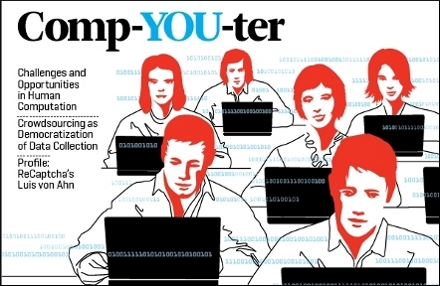COLUMN: Letter from the editor
FREE CONTENT FEATURE
Names on the page
XRDS, networking and you
By Chris Harrison

Humans are better at certain tasks than computers. In this issue of XRDS, we embrace the human side of computing and look at human computation, the act of using humans to 'compute' information, facilitated and organized with machines.
By Chris Harrison
By Michael Bernstein, Inbal Talgam-Cohen
By Vaggelis Giannikas
Labor-on-demand---it's like cloud computing but with human workers.
By Lukas Biewald
An associate professor at New York Universitys Stern School of Business uncovers answers about who are the employers in paid crowdsourcing, what tasks they post, and how much they pay.
By Panagiotis G. Ipeirotis
While many organizations turn to human computation labor markets for jobs with black-or-white solutions, there is vast potential in asking these workers for original thought and innovation.
By Aniket Kittur
A professor and several PhD students at MIT examine the challenges and opportunities in human computation.
By Robert C. Miller, Greg Little, Michael Bernstein, Jeffrey P. Bigham, Lydia B. Chilton, Max Goldman, John J. Horton, Rajeev Nayak
Can human computation bring together people from diverse backgrounds to solve age-old math problems?
By Jason Dyer
Can people help computers solve challenging optimization problems?
By Michael Mitzenmacher
Exploring Twitter and live events by structure and context can shed light on what people think.
By David A. Shamma
Paid crowd workers are not just an API call---but all too often, they are treated like one.
By M. Six Silberman, Lilly Irani, Joel Ross
Two computer scientists have created a video game about mice and elephants that can make computer encryption properly secure---as long as you play it randomly.
By Ran Halprin, Moni Naor
By Robert J. Simmons
To find out how Amazon.com runs its marketplace for crowdsourced labor, we spoke to the vice president at the company responsible for it.
By Nelson Zhang